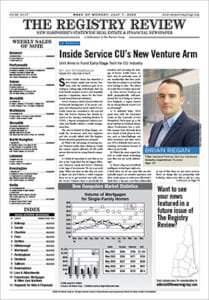
Despite a desultory 2023, driven by high interest rates, local mortgage lenders are cautiously optimistic 2024 could bring a better market, even if the Federal Reserve’s once-rumored March rate cut now seems off the table. iStock illustration
Residential lenders are seeing small signs of an improving market despite higher interest rates and lower inventories of homes for sale that continued to cut deep into institutions’ loan business in 2023.
New Hampshire banks, credit unions and mortgage companies all took hits to their residential lending business last year, across all categories of residential loan types, from single-family home mortgages to non-purchase products that include home equity loans and lines of credit, accord to data from The Warren Group, publisher of The Registry Review.
In the single-family mortgage category, Meredith Village Savings Bank once again ranked first in the state, with $44.9 million in loans in 2023. But that figure was down by 36 percent compared to 2022, when Meredith Village was also tops in single-family mortgages the Granite State, according to data.
Among credit unions, St. Mary’s Bank was the top single-family mortgage lender statewide in 2023, but that was down by 26.2 percent compared to 2022, when it was also ranked first in the single-family mortgage category.
Among mortgage companies, CMG Mortgage Inc. was a noticeable outlier, with $352 million in single-family mortgages in 2023, up 9 percent from 2022, making it tops in its category for two years in a row.
But Guild Mortgage, which ranked No. 2 in 2023, saw its single-family mortgage loan volume fall by 24 percent to $161 million last year. Meanwhile, United Shore Financial Services ranked third in 2023 with $158.9 million single-family mortgages, but that was down 42 percent compared to 2022.
Who Came Out on Top?
See our rankings of New Hampshire’s top lenders of 2023 to find out.
Similar downward trends in mortgage loan volumes applied to lenders in the condominium market as well in 2023, according to Warren Group data.
‘Non-purchase’ residential loan products – chiefly, refinances, home equity loans and home equity lines of credit (HELOCs) – saw similar downward trendlines in 2023.
At $430 million in non-purchase lending volume, Citizens Bank ranked first in New Hampshire in 2023, but that’s down 56 percent from the amount posted by the 2022 leader, Bank of America.
Among non-purchase lending for credit unions, Service Credit Union was tops in New Hampshire in 2023, with $131 million. But that was down 17.6 percent compared to its 2022 lending volume.
HELOCs a Winner
Industry executives didn’t hesitate to blame this downward lending trends on higher interest rates and lower inventories of homes for sale in New Hampshire.
The higher interest rates are not only making it more expensive for people to buy homes in general, but they’re also discouraging many potential sellers from putting their homes up for sale, they say.
The thinking: Many homeowners currently have historically low mortgage interest rates, many of them in the 3 percent range, and don’t want to buy new homes if it means taking on a new mortgage in the 7 percent range. So, such homeowners are sitting on the sidelines.
That’s led to fewer homes on the market – and fewer mortgage deals.
The higher interest rates have also meant a dramatic drying up of the home loan refinance business.
Charles Dowd, vice president and residential mortgage sales officer at Meredith Village Savings Bank, said his bank’s overall lending business was down about 40 percent in 2023.
The refi business is less than 5 percent of what it was in 2022, he noted.
But there was good news in 2023, including $50 million in HELOC business for Meredith Village Savings in 2023.
“They were pretty steady,” Dowd said of the lines-of-credit products often used by homeowners for repair and renovation projects. “It’s a great source of money for homeowners.”
Recent technology upgrades at Meredith Village also helped boost the bank’s bottom line, improving the bank’s sales, pricing and tax-analysis systems, Dowd said.
“Automating the process has really changed things for the better,” he said.
All in all, Dowd said Meredith Village was pleased with its performance last year.
“Relative to the market, we feel like we had a good year in 2023,” said Dowd.
High Rates ‘Sidelined’ Interest
Peter Fraser, senior vice president and chief consumer and residential lending director at Enterprise Bank, didn’t mince words when describing the decline in residential lending business in 2023 due to higher interest rates.
“It was disappointing as far as affordability is concerned,” he said.
According to Warren Group data, Enterprise Bank did about $108 million in non-purchase lending in 2023, ranking it an impressive fourth in the banking category of non-purchase products in New Hampshire. Based just across the state line in Lowell, Massachusetts, Enterprise Bank has eight branches in New Hampshire.
For all its branches in New Hampshire, Massachusetts and Maine, the lending business was down about 23 percent in 2023, said Fraser.
Higher interest rates ultimately hurt inventory by discouraging many potential sellers to sit tight, he said.
“That really sidelined a lot of interest. Those with previously lower interest rates are not selling.”
But like Meredith Village Savings’ Dowd, Fraser said the HELOC business continues to perform well, matching 2022 levels of business despite higher rates.
Fraser added in general of 2023: “It was a good, consistent year, in light of higher interest rates.”
Optimism for 2024
As for 2024, Dowd and Fraser said they’re cautiously optimistic about improvements in the market.
In January, Meredith Village Savings saw a 40 percent increase in mortgage applications for loans of $1 million or less, he said, while applications for mortgages above $1 million were down slightly in January.
Meanwhile, Dowd said, expected moves by the Federal Reserve to lower its benchmark interest rate in late spring or early summer could spur potential sellers to finally put their homes up for sale, slightly improving the inventory picture.
Many potential sellers also just want to finally move on selling their homes, rather than waiting much longer.
“Two years ago, they’d say, ‘We’re sticking it out,’” he said. “Now decision time is here and they want to act.”
Enterprise’s Fraser agreed that an interest-rate cut by the Fed later this year could help with the inventory problem.
“I don’t think it will be anything to write home about,” he said of possibly more home sales this coming year. “But [rate cuts] could open things up. So, yes, I see 2024 getting better.”

